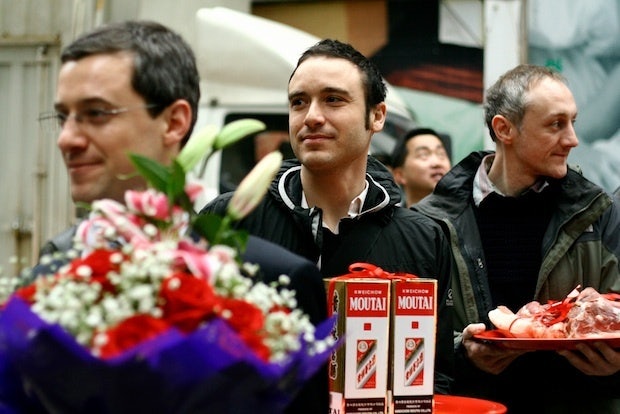
Some foreigners may like Moutai, but they're not the brand's main target. (harryalverson/Flickr)
Amidst China’s crackdown on official corruption, including luxury gifting and elaborate banquets, top-shelf bottles of the Chinese spirit baijiu has taken a major sales hit. In order to mitigate the downturn, Kweichou Moutai has set its sights abroad, but isn't necessarily targeting foreigners.
The company recently announced that it will invest 8.79 million euros in Parisian real estate in order to expand its European business after slumping bottle prices, sales, and stocks. It hopes to boost its sales abroad to counterbalance a decline in mainland sales, and has already arranged for distribution in Poland, Hungary, Slovakia, Bulgaria, and the Czech Republic, and sells bottles in duty-free stores. The spirit has also made it to one Chinese restaurant in Chicago, where it is served in a $25 cocktail.
However, rather than trying to get foreigners to take a liking to its distinctive taste, the main aim appears to be targeting wealthy Chinese travelers, who are heading abroad in greater numbers every year. According to the South China Morning Post:
“The overseas market for Moutai is really small,” an analyst in Beijing said. “They wouldn’t focus on that. And the main consumers are still Chinese abroad, because it’s cheaper and the quality of the exported product is secure.”
This strategy differs from that of Shuijingfang, a Diageo-invested baijiu company trying to market the firey drink abroad. The brand’s new American CEO Jim Rice is pushing baijiu in the United States at events such as a recent tasting event in California where he created a martini and mojito with the liquor. In a recent interview with Marketplace, he noted that this strategy must offset the fact that sales are down 50 percent and profits are down between 80 and 100 percent. According to him, “My job role today is to take a very traditional Chinese company in a very traditional Chinese industry and adapt Western practices to it. I’ve got to globalize the company.”
Moutai is far from the only Chinese beverage company acquiring European real estate. Many Chinese companies and individuals are scooping up vineyards and other beverage producers in Europe and elsewhere. In October, Changyu winery acquired Cognac trading house Roullet – Fransac. Chinese state-owned conglomerate COFCO has purchased several overseas wineries, including a 49-acre château in Bordeaux, following several other acquisitions over the years by Chinese companies: Latour-Laguens in 2008, Richelieu in 2009, Chenu Lafitte in 2010 and De Viaud and Laulan Duclos in 2011. Wealthy individual Chinese buyers are also buying French vineyards at a rapid pace.
It may not be surprising after this acquisition if Moutai decides to join the Chinese rush to purchase vineyards as well. According to The Drinks Business:
In addition to baijiu, Moutai is also trying to develop its wine brand Moutai Wine, which it set up in 2002. In April, Moutai purchased the Château Loudenne wine estate in France for €20 million (£16.7 million).
The big question from this news is which strategy will prevail—Diageo's bet that it can successfully introduce the drink to a new market, or Kweichou's belief that China's wealthy will prefer the drink of their home country wherever they happen to be.